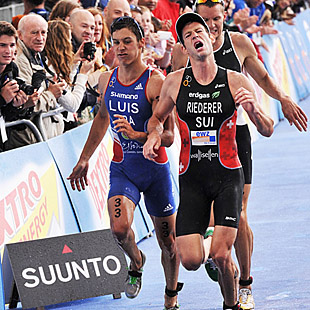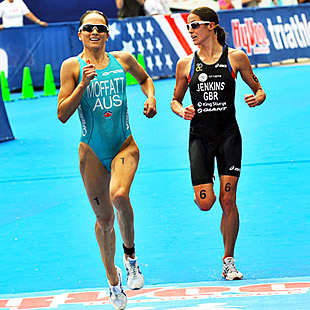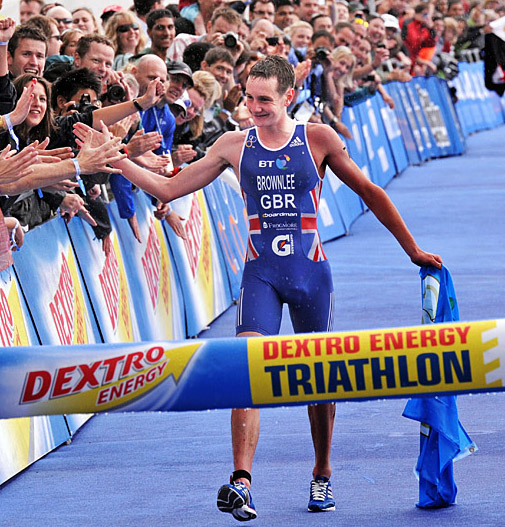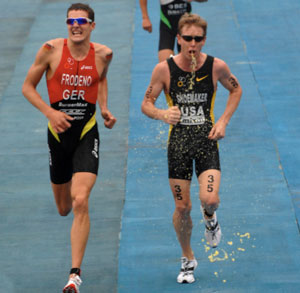London bets on Olympic Tri

Off track betting on big time sports like football, baseball and basketball has become big business in Las Vegas and Atlantic City in the United States much as wagering on soccer is huge in European and Asian capitals. But every four years, the Olympics attracts betting on minor sports that normally would not attract a scintilla of interest among the punting [betting] class. Thus visitors to London may, if they are so inclined, walk into the famed William Hill betting agency on Tottenham Court Road and plunk down a wager on even the most obscure sport with odds determined by professional compilers who have transferred their prognosticating skills well outside their usual comfort zone. But because these bets are not offered as a charity, they are carefully crafted through research so that the William Hill agency will not lose its shirt to crafty field hockey mavens nor go broke establishing odds on archers subject to hallucinations or simple jitters.
Our interest of course was focused on how William Hill handled the Olympic men’s and women’s triathlons. As I have spent some time offering prognostications on major triathlons on the Slowtwitch website, I was interested to see how the professionals handled it. In the beginning, I offered off the cuff estimations of odds which were more complimentary – too generous – to the contenders. The complaints came from two directions. On one hand, fans of various athletes complained that my odds for their champions were disrespectfully high. On the other hand, astute statisticians among our readers immediately recognized that the sum total of my odds routinely doubled or tripled the total of 100 percent chances for the field as a whole. To sum it up, any actual establishment using my betting line would have quickly gone broke. As a result, even though my odds were offered with no intention of attracting actual gambling but rather to spark debate, my esteemed online editor convinced me to eliminate the odds altogether. We decided instead to list the contenders in order of their chances of victory.
And so we see William Hill’s odds on victory by men’s favorite Alistair Brownlee were set at 1-2 – that is, bet 2 pounds to win 1 pound. Brother Jonathan Brownlee, who seems to win every World Triathlon Series triathlon when his brother is out with illness or injury, was listed next at 11-4, which is bet 4 to win 11 or may be otherwise listed as 2¾ to 1. Javier Gomez was offered at 15-2 or 7½ to 1. As the professionals were not out to assuage the pride of the triathletes., the odds rose swiftly after the top three, with Richard Murray and Alexander Bryukhankov going off at 16-1, defending Olympic champ Jan Frodeno and Sven Riederer offered at 33-1, and David Hauss listed at 40-1. In order to maintain professional integrity regarding odds, William Hill then listed three men at 50-1, 8 men at 66-1, 23 men at 100-1 and 11 men at 150-1.

While the odds I offered on our own sport were influenced solely on the estimated chances of the athletes, professional betting shops carefully shape their odds by taking into account that higher than usual numbers of bettors would pick various local favorites and distort the betting line. The betting shops want to offer much smaller returns for overwhelming favorites like Alistair Brownlee so they won’t get killed if he won. But not so high that they would discourage betting altogether.
With this in mind, I thought that odds on Alistair Brownlee were pretty right on because he does occasionally overheat and get beat. Odds on Jonathan were about right as when Alistair is healthy Jonathan never beats his brother. In addition., when both brothers are healthy, the vagaries of pack racing often relegate Jonathan in 3rd as often as he and Alistair go 1-2. Javier Gomez at 7 ½ to 1 is also a defensible guess when facing the Brownlees these days.
But further down, I see some statistical opportunities. While Jan Frodeno’s recent off-form woes make his 33-1 odds not so enticing, Richard Murray’s recent red-hot form make his 16-1 odds worth a shot. Even more enticing are the 33-1 odds on Sven Riederer, who has finished 2nd and split the Brownlees twice at big races in the past year. Then, given the absurdly high odds given several proven contenders in such a volatile sport, Steffen Justus and Bevan Docherty at 50-1 and Courtney Atkinson, Hunter Kemper, Simon Whitfield, and Kris Gemmell at 100-1 would seem to be worth a flier as well.
In the women’s Olympic triathlon, William Hill’s 3-2 odds on Helen Jenkins seem to me to be about right. But 6-1 on Nicola Spirig, 12-1 on Andrea Hewitt and Emma Moffatt, 20-1 on Gwen Jorgensen, 25-1 on Lisa Norden, and 50-1 on Laura Bennett and Sarah Groff seem too high. Given her long bout with injuries and no races this year, the great Paula Findlay seems to be given too great a chance at 6-1 odds.
While the novelty of professional odds directed at the sport of triathlon may be amusing, the effect of betting on the integrity of sports has remained a serious concern forever. There have been several famous black marks on sports in the last century, including the Black Sox scandal in which Chicago’s American League team took money from gamblers to throw the 1919 World Series, a 1950s scandal in which college basketball teams from the New York area were bribed to shave points, to international scandals with cricket teams in Asia and Australia implicated in betting scandals. Even this year at the Olympics, eight top badminton contenders were disqualified from the London Games for throwing matches in preliminary rounds – not for gamblers’ bribes but rather to obtain better seeding in the next round. With sports betting now a worldwide multi-billion dollar business, betting is a problem both for its addicting properties on the masses but also as a potentially destructive influence on sports.
But as a starting point for fierce argument on behalf of your favorite triathlete, the London odds offer a certain amusement before the matter is settled on the field of play.





